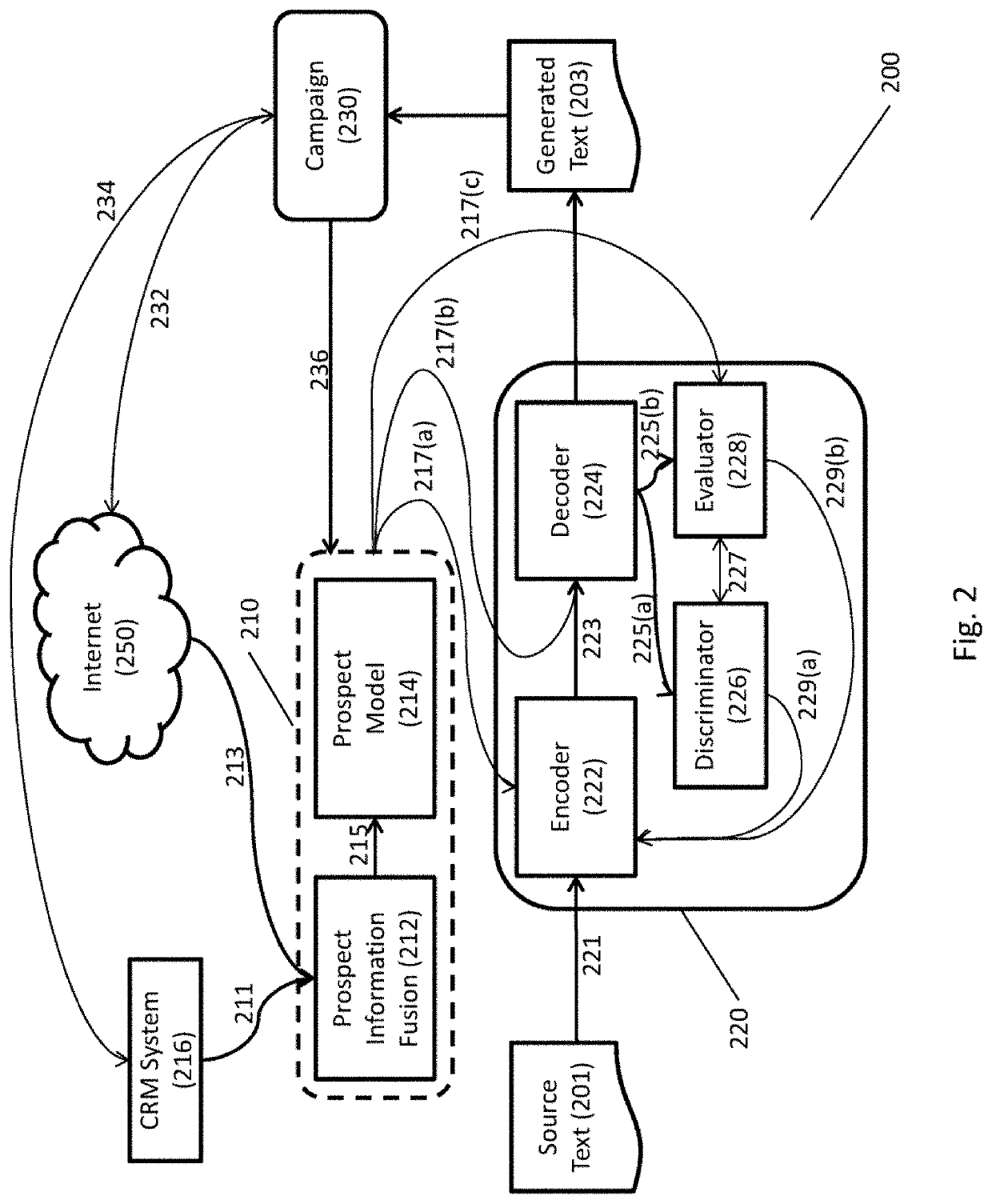Natural language generation using pinned text and multiple discriminators
a natural language and discriminator technology, applied in the field of machine learning, can solve the problems of unsolved text-output, unresolved problem of longer-form natural language generation, difficult text generation and manipulation, etc., and achieve the effect of enhancing the likelihood of successful near-human text generation and reducing variability
- Summary
- Abstract
- Description
- Claims
- Application Information
AI Technical Summary
Benefits of technology
Problems solved by technology
Method used
Image
Examples
third embodiment
[0065]In simple cases the imputation component can simply use the most common value from a particular distribution of values, perhaps modified by a Bayesian prior. However, more involved methods of imputation can also be used. FIGS. 5a-5e show one embodiment of a process used by imputation component 350. FIG. 5a shows a typical distribution of scores for one factor of the five-factor personality model across a population. For purposes of illustration, assume the plotted factor represents “openness to experience.”FIG. 5b shows a selected set of statements that have been made on the Internet or social media by the prospect. Each of these statements expresses interest in a different type of food. The vectors (a)-(d) in FIG. 5c show the change in the internal representation of a vector representing the prospect. In one embodiment, statements in 5b are transformed into a bag of words representation and stopwords removed. The vectors (a)-(d) show a portion of the vector where each element...
first embodiment
[0081]Because the “true” values associated with a personality are unknown, the values need to be inferred. There are a number of ways of doing this according to different embodiments. A first embodiment uses a variation of LDA, but instead of having the topics be statistical projections over a Dirichlet prior, the limited universe of values allows the prior to be modeled as a binomial distribution over each factor of the five factor model, with the prior modeled as:
p(q)=qα-1(1-q)β-1B(α,β)(Eq.5)
[0082]The intuition is that, similar to a topical model, the sets of observations provided in the prospect statements and the facts collected in the factual model can be explained by unobserved groups that explain why some parts of the data are similar—but instead of the similarity being due to topicality, the similarity is due to the outlook and perspective of the prospect.
[0083]In another embodiment, the prospect modeling component 214 is implemented using a neural classification network 900...
second embodiment
Where Hx is the layer in question and Ni is equal to the number of nodes in the input layer and No is equal to the number of nodes in the output layer. This architecture is designed to allow a multifactor representation of the input in the first two hidden layers, force compression of representation (and thus information loss) in the third layer, and provide an expanded representation from the compressed value to the parameters of interest in the fourth and fifth layers. In a second embodiment, there are three hidden layers with sizes approximately equal to:
H1=⅔(Ni)
H2=½(Ni)
H3=4 / 3(No) (Eq. 7)
This embodiment proceeds from the perception that this is a multi-factor mapping problem from a higher to a lower dimensional space, so a straightforward compressive architecture should be sufficient, with the advantage of being easier to train and not suffering as much from the disappearing gradient problem. The number of output nodes 916 is sized to the personality model—in the case of the sam...
PUM
 Login to View More
Login to View More Abstract
Description
Claims
Application Information
 Login to View More
Login to View More - R&D
- Intellectual Property
- Life Sciences
- Materials
- Tech Scout
- Unparalleled Data Quality
- Higher Quality Content
- 60% Fewer Hallucinations
Browse by: Latest US Patents, China's latest patents, Technical Efficacy Thesaurus, Application Domain, Technology Topic, Popular Technical Reports.
© 2025 PatSnap. All rights reserved.Legal|Privacy policy|Modern Slavery Act Transparency Statement|Sitemap|About US| Contact US: help@patsnap.com



